The last thing I expected to discover in a land defined by settlements, segregation, intimidation and a lack of forgiveness
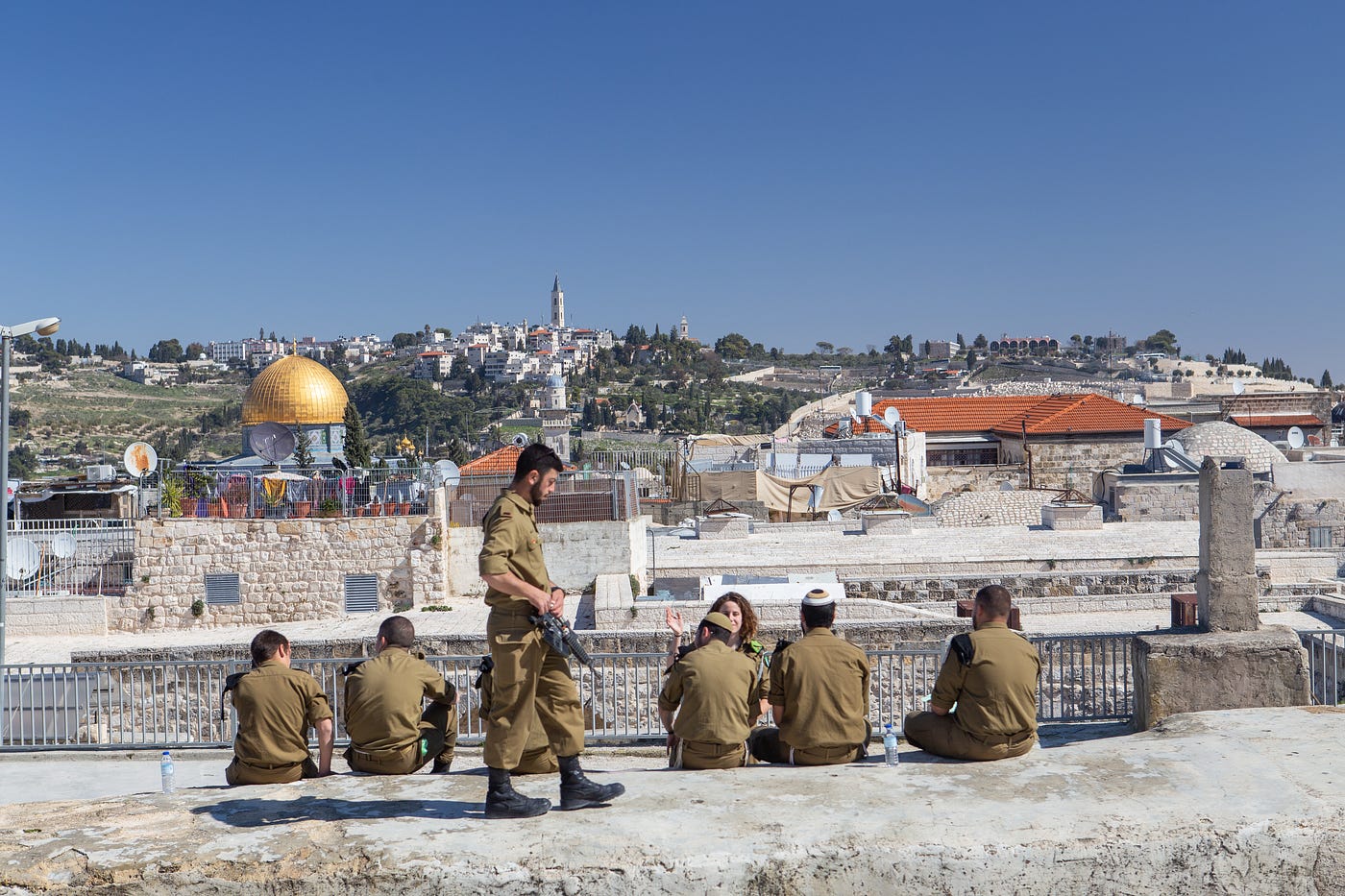
– by Peter Marks –
I traveled to Israel and Palestine for the first time at age 36, but I’ve dreamed of visiting it for decades. While I do not consider myself a particularly religious person, Judaism and Christianity both played a role in my spiritual and political upbringing. I was not raised Jewish, but my family celebrated Jewish holidays with our Jewish cousins. I went to Jewish preschool and later remembered the sinking feeling in my stomach when my 8th grade history teacher told me that my Jewish ancestry could have qualified me for a concentration camp.
Around the same time, my parents started taking me to Episcopalian church, where I became active in a high school youth group and I bonded with friends I remain close with to this day. I vividly remember that group discussing in 2001 how to respond to the events of September 11th through the lens of Christ’s teachings, which meant not going to war. It was a bold, courageous stance that few were even willing to discuss at that time as it could call into question your patriotism. I’ve never felt more spiritually connected to Christianity than at that moment. For me, spirituality has felt the most real when it rallies people in a community to stand up for something important, which probably explains why I became a community organizer.
In college, my involvement in Christianity faded away as I found other communities and became disillusioned by Christianity’s dominant role in society. At the same time, I was intrigued when I learned that my Jewish ancestry might qualify me for a free trip to Israel through a program called Birthright. I remember talking with a girl freshman year of college who had done the program and, despite having progressive views, changed her political party registration from Democrat to Republican as she felt Republicans were more committed to protecting her ancestral homeland. How had this travel experience informed her spirituality to the point that it overruled her personal politics?
My trip
Fast forward a couple decades to February of 2022. I find a month between my political jobs to travel to the Middle East with my wife Kait. She is particularly interested in the spiritual history of Jerusalem and Egypt, which we also visited. I was intent on seeing the political situation of this multi-identity place first hand. However, I also ended up examining the multiple identities in my own spirituality, demonstrating again how linked politics and spirituality are for me. The experience is something I’ll hold onto forever and it left me with new perspectives. I wrote this article to process it internally and also to share for those interested.
The itinerary was planned around spiritual and political sites, but also around people. Hours of the trip flew by talking about the conflict with people from different perspectives: Palestinian guides, former Israeli military personnel, Arab Christians and more. The Palestinian guides, who I booked through Green Olive Tours, were able to show me a lot of their experience in the West Bank first hand and were eager to talk about the political situation, so a lot of my perception was influenced by that. That said, I did my own research and tried to get other perspectives on some of their claims to get as balanced a picture as possible.
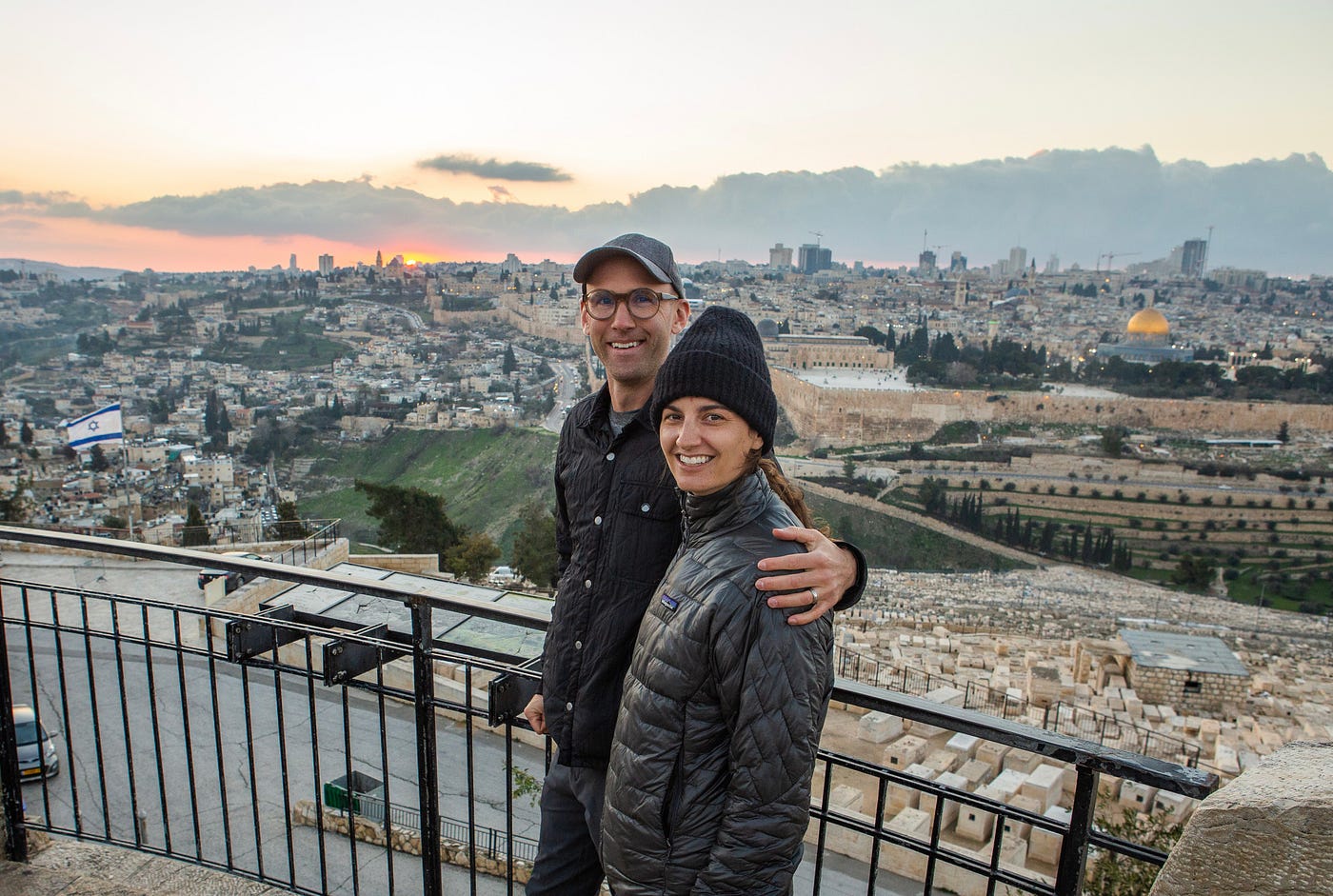
Settlements
10 minutes driving outside of the Jerusalem old city, we started seeing “settlements”, which are essentially self-contained communities created by the Israeli government in Palestinian territory. There are about half a million Israeli settlers living in state-sponsored settlements in the West Bank and East Jerusalem, all of which are deemed illegal by the UN. That number has grown steadily in the past few decades and continues today. Seeing Israeli settlements under construction a quarter mile away from Palestinian communities illustrated how real and intense this issue currently is.
Some of the settlements I saw were even closer to Palestinian communities. In Hebron, Israeli settlements built literally on top of a Palestinian market, separated by a ceiling of wire fencing. The ceiling had trash piled up on it, which the Palestinians in the market explained was discarded by the Israeli settlers living above. The Israeli settlements are visually different from the Palestinian communities in that they are newly constructed and lack signs of resource hardship like abundant water tanks. Water is an existential issue in this part of the world and many Palestinians we talked to feel their communities are being put at risk by water-consuming Israeli settlements popping up next to theirs that are beyond their control. It was explained to me that there is not anything the Palestinian government can do about these settlements as the US-funded Israeli military is simply too strong for them to put up a credible fight.
I heard many rationales for why the Israeli government is creating these settlements. One theory offered by my childhood friend, who is a former member of the Israeli military, is that it’s vital for Israel to occupy that area as it would make them vulnerable to attack. Indeed, I saw several Israeli Military bases inside the West Bank, which are also deemed illegal by the UN. While this may be true in part, to me it doesn’t explain the half million Israeli civilians in the area. The reason for settlements offered by the Palestinians we talked to is that they’re trying to weaken the power and legitimacy of of the Palestinian state by partitioning it and co-opting it. My former Israeli military friend agreed that this is also a plausible explanation.

Segregation
One of the main ways the Palestinians I talked to claim Israel is partitioning the West Bank is through their transportation infrastructure. I saw “Jews only” bus stops outside settlements with armed Israeli guards. I also saw roads under construction in the West Bank for the exclusive use of Israeli settlers. Lastly and perhaps most famously, there is the Banksy-graffitied separation wall in the Palestinian city of Bethlehem, which is also known for being birthplace of Jesus.
Perhaps the most consequential form of separation, however, are the enormous red signs at every highway exit warning Israelis not to enter Palestinian territory and that their lives are at risk if they do. These Israeli-defined de facto borders could be seen as a legitimate way to protect what’s left of Palestinian controlled territory. However, it also seems to have the effect of limiting Israeli citizens visibility into what’s going on inside Palestinian cities. Some Israelis assume Palestine is prospering on a similar level as Israel while others presume it’s a cesspool of terrorism. The signaling also limits intermixing with Palestinians outside of a commercial context.
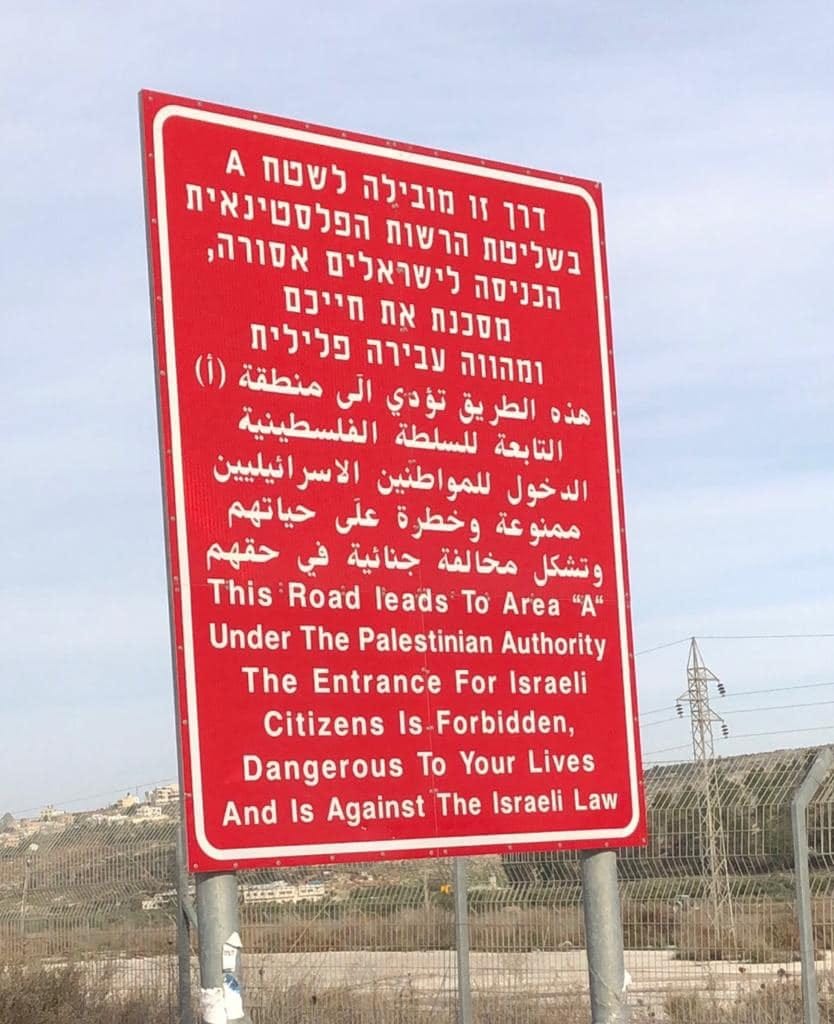
The segregation between Israeli and Palestinian citizens has been compared to South African apartheid, but there is nuance and exception. The separation is not race or religion-based as evidenced by 15% of Israel’s citizens being Muslim. Some Muslims even choose to serve in the Israeli military. For these reasons, I believe it’s messy to directly compare the race-based segregation systems of South African Apartheid and the Jim Crow era American South to the Israeli occupation of Palestine, even though I witnessed clear commonalities.
Intimidation
The most clear example I saw of intimidation came outside the Cave of the Patriarchs, a single building divided into a mosque and synagogue in Hebron, Palestine. This multi-faith holy site houses the tomb of Abraham and other Old Testament patriarchs. There is a Palestinian market outside the mosque that is supposed to be closed, but a merchant friend of our Palestinian guide has been opening his shop every day for years in defiance. I saw a large white off-road vehicle with an Israeli flag park right in front of this merchant’s store on an otherwise empty street, then a heavily armed civilian exited the vehicle. Our guide identified this person as an infamous Israeli settler who has killed multiple Palestinians and regularly intimidates their community, pulling up a YouTube video where this man was clearly intimidating and getting physical with Palestinians.
When I told my former Israeli military friend this story, he described this settler as the absolute worst kind of Israeli: bigoted, aggressive and disrespectful of history. The exact site of this provocation is home to terrorist attacks from both sides. In 1929, Arabs killed 69 Jews here based on rumors that they were plotting a take over. More recently in 1994, a far right Israeli American named Baruch Goldstein opened fire on a large number of Palestinian Muslims who had gathered to pray inside the Mosque. The attack left 29 people dead, several as young as twelve, and 125 wounded. My guide claimed a tomb venerating Goldstein remains in a nearby Israeli settlement. I couldn’t find evidence of that online, but it does appear Goldstein was celebrated by far-right Israelis long after his death.
It was disheartening to see the Israeli military guards not respond to this menacing character. It makes it easier to believe the systematized intimidations in Hebron as told by Israeli soldiers themselves in this recent video from the New York Times. My Palestinian guide points to this sort intimidation as an example for how tensions escalate and result in violence. He believes that the Israeli occupation will eventually boil over and lead to another ugly round of violence in the West Bank if this intimidation is not stopped.
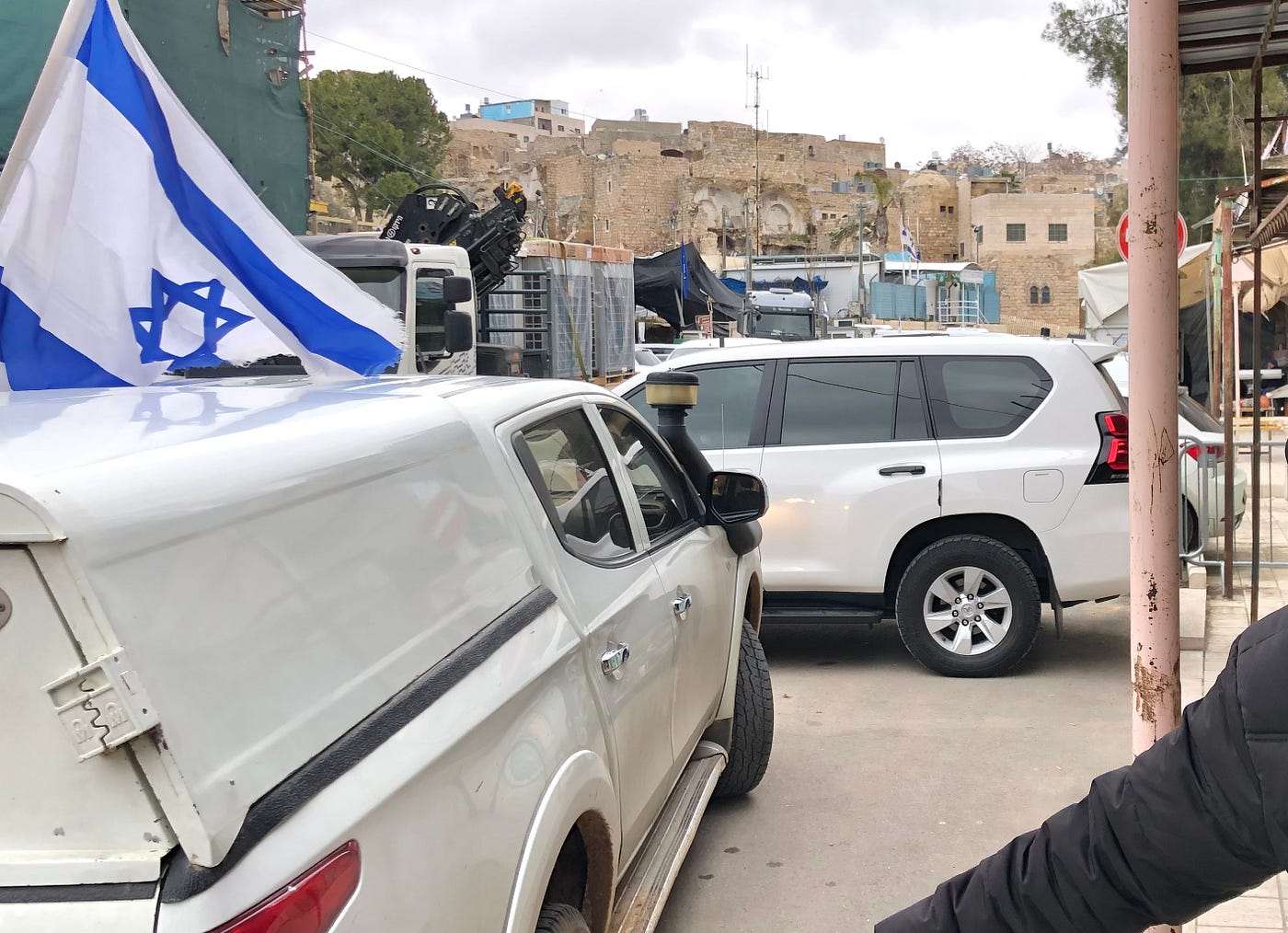
The “two state solution”
I had long thought of the “two state solution” as a middle ground viewpoint as it seems to acknowledge that both Israel and Palestine have a right to exist. I was somewhat surprised to hear my Palestinian guides reject this, not because they think Israel should not exist but because they’ve lived in two states for decades. The result is that their state is completely subjugated by Israel, a reality my former Israeli military friend also acknowledges. The only vote they can cast is for a Palestinian government that is unable to stand up to land and resource grabs of Israel. To them, “two states” is not Democracy. It’s the status quo.
What I heard the Palestinian guides propose is a one-state, multi-faith Democracy comprised of Israel and the Palestinian territories of the West Bank and possibly also Gaza. This would balance the Demographics of the country to approximately half Jewish and half Muslim, making it difficult for one group the subjugate the other. Additionally, they want a “right of return”, a reparation of sorts for Palestinian refugees to get their occupied land back. When I asked my former Israeli military friend who is clearly sympathetic to Palestinians on some level, he suggested a more realistic solution would be for the West Bank to merge with a democratized Jordan, which borders the West Bank and also contains a large number of Palestinian people. It’s unclear to me what would become of the half million Israeli settlers in that circumstance.
I don’t claim to have the answers for peace. Like any negotiation, both sides will have to compromise on a way forward or else accept the status quo.

Jesus to the rescue
The best relief I found to burn off the West Bank’s fascinating tension was pickup hoops at the Jerusalem YMCA. I was shooting baskets on Saturday morning as a group of Arab Christians entered the gym. I expected to be told that they had the court reserved, but was instead asked if I wanted to play. So I did! Poorly! Despite their repeated frustrations vented by my teammates in a combination of Arabic and English that I, the relatively tall and young guy, was not taking it to the hoop strong enough, I felt welcomed by them. It was a unique feeling in a land defined by who owns which turf.
The Christian community in Jerusalem is small — only about 10,000 people in a city of nearly one million. They’re a tight-knit minority community where everyone seems to know each other, even across the various denominations. I became less enthusiastic about my Christian identity after high school, in part because I felt like it was conflated with dominant American conservative institutions I didn’t identify with. This different context made me look at Christianity in a new light.

Beyond the Banksy-illustrated separation wall of Bethlehem, I found myself at the altar of the Church of the Nativity — theoretically the exact place Jesus was born. Our tour guide seemed to assume we were practicing Christians and instructed us to pray while he recited The Lord’s Prayer in Aramaic. I don’t really pray, but I found myself mentally translating the prayer into English, evoking the thousands of times I heard it in my delicate high school years. As I mentally recited “forgive us our trespasses, as we forgive those who trespass against us”, an unexpected tear fell.
I remembered the exact moment that the concept of forgiveness clicked for me. Father Shannon at my Episcopalian Church explained something along the lines of “you don’t just forgive to do right by the other person, you also forgive to do right by yourself”. He explained by citing studies of how holding a grudge is 10x more stressful than letting it go. My lived experience as an adult knows this spiritual and pseudo-scientific teaching to be the truth. “Just let it go and move forward” is the best course of action in pretty much every anger-producing situation. It’s something I frequently wish I did more often. From that moment on, I started looking at my time in the West Bank through a lens of forgiveness.
I found myself wondering how do you “forgive” and “let it go and move forward” in a tense political situation where the livelihoods of millions of people are on the line? Perhaps it starts with putting aside the grievances of your forebears and instead focusing on the harm being done in the present moment. The Israeli government is harming Palestinians at this moment through settlements, segregation and intimidation. I’ve seen it with my own eyes. I’m not anti-Semitic, which is often a label thrown at people criticizing Israel. Nor am I “taking Palestine’s side”. Palestinians are probably causing material harm in some other way I can’t defend. It’s unclear who we should be angry at because we’re all part of the problem.

We’re not separate
My wife Kait’s Catholic school upbringing has made her eternally skeptical of Christianity as an institution. Yet, she is a very spiritual person who identifies strongly with the spiritual philosophy of “Nondualism”. There are many different definitions of the term, but to her it generally means we’re all connected and that the world’s ills are largely explained by an illusion of “separateness”. We discussed it a fair amount on our trip, especially as we visited religious sites of figures Kait sees as nondual teachers.
Parts of Nondualism seem very aligned with my own spiritual/political worldview. After all, I worked for a recent presidential candidate whose campaign slogan was “Not me, us”. Other parts of Nondualism feel too hippy for me to relate to just as some parts of my political-influenced spirituality feel too divisive for Kait to relate to. Usually we laugh about our differences. Sometimes we fight. Turns out forgiveness is also a helpful practice for the many conflicts you go through in a 12-year-long romantic relationship.
The part of nondualism that resonates the most with me is that, much as we like to point the finger, we are not separate from the world’s problems. We all participate in status-quo systems that produce at least partially negative outcomes. If you are an Israeli taxpayer, you help fund settlements, segregation and intimidation. If you are a US taxpayer, you also fund settlements, segregation and intimidation in Israel through $3.8B a year in aid, not to mention funding various other wars where people die. If you are a Palestinian activist accusing Jewish members of the military of being bigoted brainwashed Zionists and accusing Muslim members of the Israeli military of being sellouts, you are failing to understand that their motives are not very different from your own.
I hadn’t properly caught up with my childhood friend since he joined the Israeli military seven years ago. His story of how and why he joined the military was fascinating. His experience going to college close to home in Oregon left him feeling empty. His horizons hadn’t been broadened, his community felt flaky and he didn’t feel he’d found his calling. When he joined the Israeli military, he bonded with impoverished Jews from Ukraine who immigrated for a better life, with wealthier Jews from the UK, with easy going Jews from Morocco, and with non-Jewish Arab Israelis who wanted to be more accepted in their country. He made deep friendships that form the basis of his community today as a civilian living in Tel Aviv. Like everyone else in the world, my friend and his friends in the Israeli army seek a strong community and a sense of purpose. They discuss these very issues together, which is something we could all be doing more of.

Relationships matter
Minds of Israelis, Palestinians and Americans will have to change if we are to move past the status quo of settlements, segregation, intimidation and a lack of forgiveness. Pointing fingers doesn’t change minds. We all have to channel our anger and frustration in a more productive direction. My experience as an organizer tells me that most of us can make the biggest impact through our relationships, especially today in such a polarized media environment where people don’t know who to trust. It’s a two way street, though. You have to be willing to listen.
I had some preconceived notions about the situation when I arrived, but I tried to focus on asking questions of myself and others. I wouldn’t have gotten the same learning experiences and personal growth if I arrived intent on protesting or lecturing others. That is perhaps the biggest learning I’m taking away from the trip.
You don’t have to travel to Israel to have these conversations. Talk to your friends about the Israeli occupation of Palestine, especially if they’ve gone through a program like Birthright or spent time in Israel. Talk to your pro-Palestinian activist friends if they demonize Israeli soldiers or Jewish people in general. Call your congressperson, thank them for something they did right, then perhaps question their support for the $3.8B in aid we give every year to Israel.
If possible, travel to Israel and Palestine and make new relationships with people there. Do your research and don’t be afraid. It’s beautiful, ugly and fascinating all at the same time, just like America. The old city of Jerusalem is a maze of living history. The Dead Sea is gravity defying beach paradise. Bethlehem is a caricature of our society. Tel Aviv is a young, vibrant, cosmopolitan city which in non-covid-times I hear has a stellar electronic music scene. The food and weather is phenomenal throughout the region. I found my trip there meaningful on a plethora of levels and I think you will too.
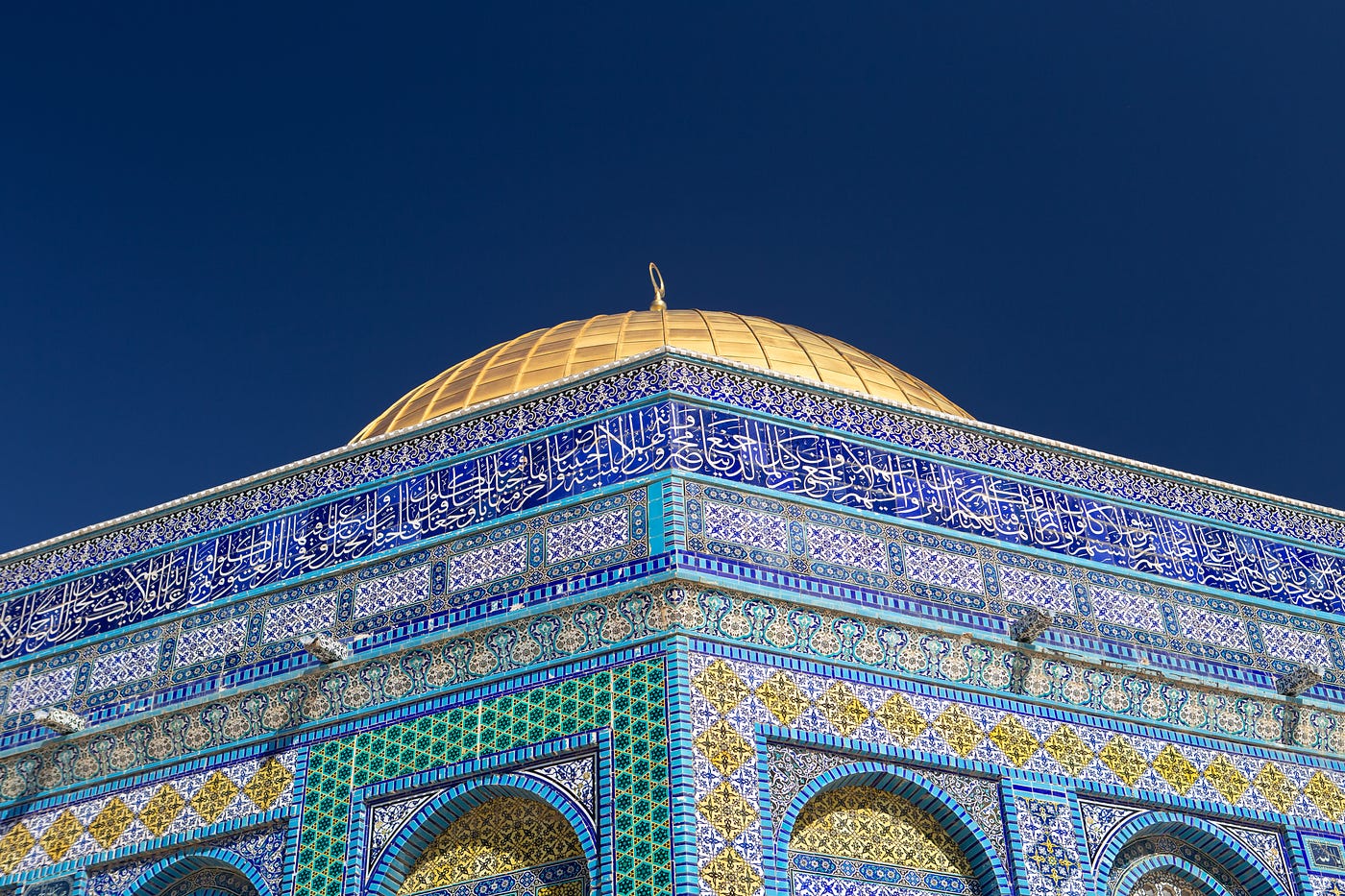
This article was originally published on Peter Marks’ blog and was republished with the permission of the author. Peter Marks (@petermarks) is a U.S. Presidential Innovation Fellow as well as a community organizer at @RhythmNationPDX. He’s also a former technology staffer of the Bernie Sanders and Joe Biden 2020 presidential campaigns.

Comment (0)